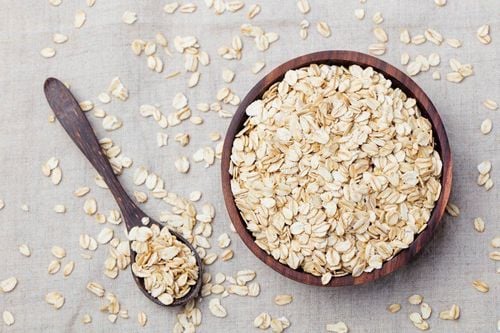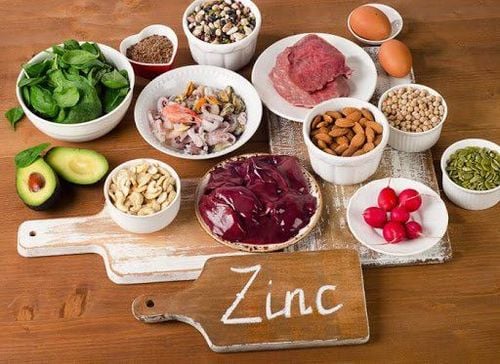There are many factors that affect a child's development, including weight. The condition of a 1-year-old baby not gaining weight can be a warning sign that the child's health is affected. Therefore, parents need to find out the cause to fix it early.
1. Causes of a 1-Year-Old Not Gaining Weight
Parents often take great care of their children, yet some are still criticized for being small and skinny, especially 1-year-olds who eat well but fail to gain weight. This can create significant stress for parents and may even lead to forcing the child to eat more, which negatively impacts the child’s psychological well-being.
Poor nutrient absorption is a common reason why a 1-year-old may not gain weight. Nutrients are not properly absorbed during digestion, leading to deficiencies, stunted growth, and slow weight gain.
Children with poor nutrient absorption often exhibit symptoms like:
- Show symptoms of digestive disorders caused by infections such as pharyngitis, tonsillitis, or bronchitis.
- Follow an unbalanced or inadequate diet.
- Are undergoing treatment for other intestinal diseases.
- Suffer from micronutrient deficiencies, which reduce the secretion of digestive enzymes.
When poor absorption persists, the child may experience energy and nutrient deficiencies, leading to slow weight and height growth, rickets, malnutrition, and stunted brain development.
Additionally, the child’s immune system may weaken, reducing their ability to fight off pathogens such as bacteria and viruses. This increases the risk of infections, which further hampers the child’s development, creating a vicious cycle of illness and delayed growth.
According to recommendations from the National Institute of Nutrition, children’s development varies across different stages. For 1-year-old children, their weight is typically three times their birth weight, around 9–10 kg. Their height also increases approximately 1.5 times their birth length, to about 75 cm. To monitor a child’s growth, parents should regularly measure their weight and height and use growth charts to assess their development. This helps identify issues and enables timely interventions.
When parents notice that their 1-year-old is not gaining weight along with symptoms such as malnutrition, stunted height growth, occasional or frequent abdominal pain, weight loss, fatigue, or reduced alertness, they should take the child to a doctor for timely evaluation and treatment.
In addition to these signs, the child may also show symptoms of micronutrient deficiencies, such as: pale mucous membranes and pale skin (indicative of iron-deficiency anemia), swelling (caused by vitamin B1 deficiency), muscle pain or cramps (due to calcium deficiency)...Therefore, early detection is essential to address the condition promptly.

2. Solutions to Improve Weight Gain in 1-Year-Olds
2.1. Balanced and Adequate Nutrition
Nutrition is considered a decisive factor for a child's weight and development. To help children gain weight effectively, parents should provide a diet that includes the following nutrient groups:
- Carbohydrate-rich foods: Include cereals, potatoes, cassava… to supply energy and essential fiber for the child's body.
- Fat-rich foods: Include cooking oil, animal fat, butter, cheese… to provide energy in its most concentrated form. Fats help keep the child's skin smooth and healthy, enhance the absorption of fat-soluble vitamins, and support brain and nervous system development.
- Protein-rich foods: Include meat, fish, eggs, shrimp, crab, eel, frog … to help build the body and synthesize antibodies, protecting against external environmental factors.
- Vitamin and mineral-rich foods: Include green vegetables and ripe fruits, which provide essential vitamins and minerals to regulate bodily functions, prevent constipation, and support the overall health of the child.
Offer a variety of meals each day to keep your child interested in eating.
2.2. Supplementing Micronutrients from Various Food Sources
In cases where a 1-year-old is not gaining weight, parents should add micronutrients to the child's diet to boost the body's metabolic processes. Supplementing from different food sources ensures the child meets the recommended nutritional requirements, promoting better digestion, height and brain development, and reducing malnutrition and rickets.
2.3. Adding Fats to Daily Meals
Fats provide energy, help dissolve certain micronutrients for better absorption. In addition, fats contain many beneficial components for a child's brain development, such as omega-3 fatty acids…
2.4. Avoid Forcing the Child to Eat
Parents should divide meals into smaller portions and adhere to the principle of not forcing the child to eat. Some parents believe that forcing children to finish their portions ensures sufficient nutrient intake. However, this approach can backfire, causing fear during mealtimes and even non-cooperation from the child.
Try serving 5–6 smaller meals a day instead of the usual three to make eating more enjoyable for your child. This approach can make mealtime more enjoyable and comfortable for the child.

2.5. Encourage Appropriate Physical Activity
Parents should guide children to engage in regular physical activity. Exercise not only helps burn calories and eliminate toxins from the body but also promotes better height development and stimulates digestion, enhancing the child's appetite.
Parents can encourage children to combine physical exercise with games. This approach fosters creativity, brain development, and mental stimulation while keeping the child active and engaged.
In addition to changes in diet, habits, and physical activity, children should also receive supplements of essential micronutrients, such as zinc, selenium, chromium, vitamins B1 and B6, ginger, and acerola extract (vitamin C)...These nutrients help improve appetite, support proper height and weight development, strengthen the immune system, and boost resistance to common illnesses and digestive issues.
Improvement may take time, so parents are advised to remain calm and patient when supplementing the child’s diet through food or functional products. When using functional foods, it is crucial to select products made from natural ingredients that are easy to absorb. Avoid giving children multiple types of supplements simultaneously or frequently changing between products.













